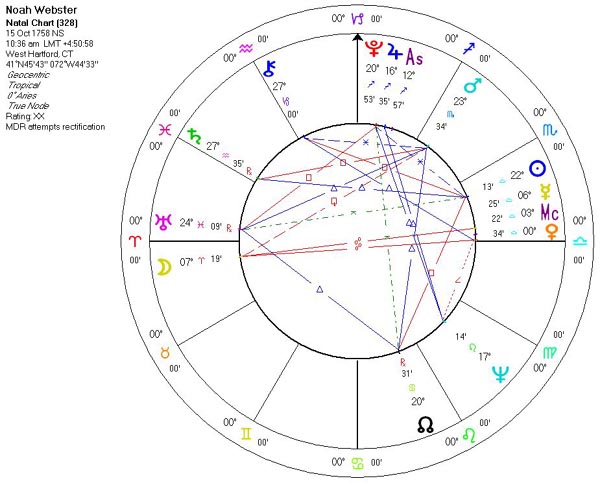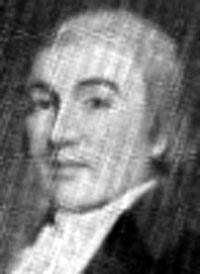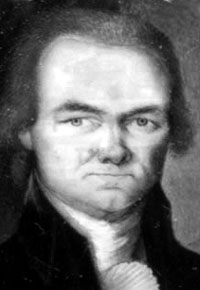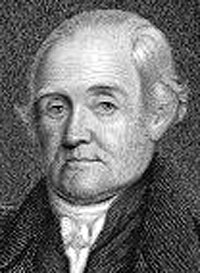Copyright Michael D. Robbins 2005
Astro-Rayological
Interpretation & Charts
Quotes
Biography
Images and Physiognomic Interpretation
"When you become entitled to exercise the right of voting for public officers, let it be impressed on your mind that God commands you to choose for rulers, "just men who will rule in the fear of God." The preservation of [our] government depends on the faithful discharge of this Duty; if the citizens neglect their Duty and place unprincipled men in office, the government will soon be corrupted; laws will be made, not for the public good so much as for selfish or local purposes; corrupt or incompetent men will be appointed to execute the Laws; the public revenues will be squandered on unworthy men; and the rights of the citizen will be violated or disregarded. If [our] government fails to secure public prosperity and happiness, it must be because the citizens neglect the Divine Commands, and elect bad men to make and administer the Laws." -History of United States by r.
All the miseries and evils which men suffer from vice, crime, ambition, injustice, oppression, slavery and war, proceed from their despising or neglecting the precepts contained in the Bible.
In my view, the Christian religion is the most important and one of the first things in which all children, under a free government ought to be instructed.
It is the sincere desire of the writer that our citizens should early understand that the genuine source of correct republican principles is the bible, particularly the New Testament or the Christian religion.
No truth is more evident to my mind than that the Christian religion must be the basis of any government intended to secure the rights and privileges of a free people.
The ecclesiastical establishments of Europe which serve to support tyrannical governments are not the Christian religion but abuses and corruptions of it.
When a citizen gives his suffrage to a man of known immorality he abuses his trust; he sacrifices not only his own interest, but that of his neighbor; he betrays the interest of his country.
r was born on October 16, 1758, in the West Division of Hartford. Noah's was an average colonial family. His father farmed and worked as a weaver. His mother worked at home. Noah and his two brothers, Charles and Abraham, helped their father with the farm work. Noah's sisters, Mercy and Jerusha, worked with their mother to keep house and to make food and clothing for the family.
Few people went to college, but Noah loved to learn so his parents let him go to Yale, Connecticut's only college. He left for New Haven in 1774, when he was 16. Noah's years at Yale coincided with the Revolutionary War. Because New Haven had food shortages during this time, many of Noah's classes were held in Glastonbury.
Noah graduated in 1778. He wanted to study law, but his parents could not afford to give him more money for school. So, in order to earn a living, Noah taught school in Glastonbury, Hartford and West Hartford. Later he studied law.
Noah did not like American schools. Sometimes 70 children of all ages were crammed into one-room schoolhouses with no desks, poor books, and untrained teachers. Their books came from England. Noah thought that Americans should learn from American books, so in 1783, Noah wrote his own textbook: A Grammatical Institute of the English Language. Most people called it the "Blue-backed Speller" because of its blue cover.
For 100 years, Noah's book taught children how to read, spell, and pronounce words. It was the most popular American book of its time. Ben Franklin used Noah's book to teach his granddaughter to read.
In 1789, Noah married Rebecca Greenleaf. They had eight children. Noah carried raisins and candies in his pockets for the children to enjoy. The Websters lived in New Haven, then moved to Amherst, MA. There, Noah helped to start Amherst College. Later the family moved back to New Haven.
When Noah was 43, he started writing the first American dictionary. He did this because Americans in different parts of the country spelled, pronounced and used words differently. He thought that all Americans should speak the same way. He also thought that Americans should not speak and spell just like the English.
Noah used American spellings like "color" instead of the English "colour" and "music" instead " of "musick". He also added American words that weren't in English dictionaries like "skunk" and "squash". It took him over 27 years to write his book. When finished in 1828, at the age of 70, Noah's dictionary had 70,000 words in it.
Noah did many things in his life. He worked for copyright laws, wrote textbooks, Americanized the English language, and edited magazines. When died in 1843 he was considered an American hero.
Webster was America's greatest lexicographer, with mastery of twenty languages that included Chaldean, Syriac, Hebrew, Arabic, Ethiopic, and Persian. Born in West Hartford, Conneticut, in 1758, he graduated from Yale with the degree of B.A. He taught school for a few years as he studied to get his law degree. Though he was admitted to the Bar in 1781, he did not go into active practice until 1789. He found that law was not to be his calling.
In 1782 Webster taught school in Goshen, New York. During this time he identified the need for American schools to have textbooks on the American language and experience as opposed to the British texts which they currently used. Thus he wrote a three-volume work, the first volume of which was a speller. This speller, known as the "Blue-backed Speller" because of its blue binding, became widely used in American schools for a long time. Though the remaining two volumes, a grammar book and a reader, were less popular, Webster is still remembered in education today for the speller, which was officially named "The American Spelling Book".
His other contribution to American culture at large was his publication of the first uniquely American dictionary. He worked many years to create a dictionary in the language Americans used instead of following dictionaries made in the British tradition. Though he was widely criticized during his work on this project, when the dictionary was published in America in 1828 it drew acclaim both in the United States and England. It was called "An American Dictionary of the English Language" and was adopted by Congress in 1831 as the national standard.
(October 16, 1758 - April 15, 1843) was an American lexicographer, textbook author, Bible translator, and spelling reformer, writer, and editor.
Webster's Dictionary
Webster published his first dictionary of the English language in 1806, and in 1828 published the first edition of his An American Dictionary of the English Language, whose title reveals his ambitions (copyrighted on April 14th that year). Webster changed the spelling of many words in his dictionaries in an attempt to make them more phonetic. Many of the differences between American English and other English variants evident today originated this way.Webster's dictionary was so popular that "Webster's" became synonymous with dictionary to many Americans. As a result, the Webster's name lost trademark protection and is now used by numerous publishers in the titles of their dictionaries. Among these, the Merriam-Webster's dictionary is considered to be the most direct descendant of r's lexicographical tradition, the Merriam brothers having purchased the rights to revise the dictionary from Webster's heirs upon his death in 1843. The 1913 version of the Webster's Dictionary also gained some prominence in modern times.
Webster's Bible
Besides his dictionaries, Webster also released his own translation of the Bible in 1833. In doing the translation, Webster used the King James Version as a base. He consulted the Hebrew and Greek along with various other versions and commentaries. Webster molded the KJV to correct grammar, replaced words that were no longer used, and did away with words and phases that could be seen as offensive to people.Webster's Works Today
All editions of Webster's Dictionary published in 1913 and earlier, along with the Webster Bible, and Dissertations on the English Language are available in the public domain.While r, just a few years after producing his famous Dictionary of the English Language, would produce his own modern translation of the English Bible in 1833; the public remained too loyal to the King James Version for Webster’s version to have much impact.
was an American lexicographer, journalist, textbook author, and spelling reformer. He was born at West Hartford, Connecticut, on the 16th of October 1758. He was descended from John Webster of Hartford, (who was Governor of Connecticut in 1656-1657), and on his mother's side from Governor William Bradford of Plymouth.
entered Yale University in 1774, graduating in 1778. He studied law, and was admitted to the bar at Hartford in 1781. In 1782-1783 he taught in a classical school at Goshen, New York, and became convinced of the need of better textbooks of English. In 1783-1785 he published at Hartford A Grammatical Institute of the English Language, in three parts, a spelling-book, a grammar and a reader. This was the pioneer American work in its field, and it soon found a place in most of the schools of the United States. During the twenty years in which Webster was preparing his dictionary, his income from the spelling-book, though the royalty was less than a cent a copy, was enough to support his family; and before 1861 the sale reached more than a million copies a year. The wide use of this book contributed greatly to uniformity of pronunciation in the United States, and, with his dictionary, secured the general adoption in the United States of a simpler system of spelling than that current in England.
In 1788 r started in New York the American Magazine, but it failed at the end of a year, and he resumed the practice of law at Hartford. In 1793, to support Washington's administration, he removed to New York and established a daily paper, the Minerva. Later, he started a semi-weekly paper, the Herald (later called the New York Spectator). In 1798 he moved to New Haven. r also served in the Connecticut House of Representatives in 1800 and 1802-07, and as a county judge in 1807.
published his first dictionary of the English language in 1806, and in 1828 published the first edition of his An American Dictionary of the English Language. The work came out in 1828 in two volumes. It contained 12,000 words and from 30,000 to 40,000 definitions that had not appeared in any earlier dictionary. In 1840 the second edition, corrected and enlarged, came out, in two volumes. He completed the revision of an appendix a few days before his death, which occurred in New Haven on the 28th of May 1843.
Webster changed the spelling of many words in his dictionaries in an attempt to make them more phonetic. Many of the differences between American English and other English variants evident today originated this way. The modern convention of having only one acceptable and correct spelling for a word is due mostly to the efforts of Webster, in standardizing spelling. Prior to this, the popular sentiment toward spelling might have best been summed up by Benjamin Franklin who said that he “had no use for a man with but one spelling for a word.”
Webster's dictionary was so popular that "Webster's" became synonymous with dictionary to many Americans. As a result, the Webster's name lost trademark protection and is now used by numerous publishers in the titles of their dictionaries. Among these, the Merriam-Webster's dictionary is considered to be the most direct descendent of r's lexicographical tradition, the Merriam brothers having purchased the rights to revise the dictionary from Webster's heirs upon his death.
s Bible
While Webster’s association with the dictionary is common knowledge, it is not so widely known that r produced his own modern English translation of the Bible in 1833.Though an excellent and highly accurate translation, Webster’s Bible was not widely accepted, due to the continued popularity of the ancient King James version. It was, however, was the most significant English language translation of the scriptures to be done since the King James version of more than 200 years earlier. The “Webster Version” of the Bible has actually enjoyed a recent increase in popularity in electronic and “online” formats (such as is available at WWW.BIBLES.NET and other Biblical resource websites) because it is one of few modern English translations of the scriptures which may be freely used without paying any royalty, as its age makes it public domain material.






